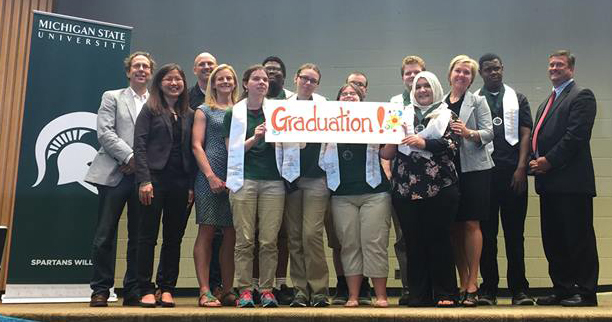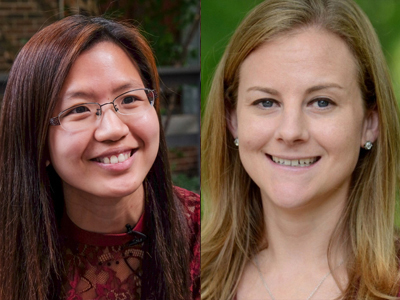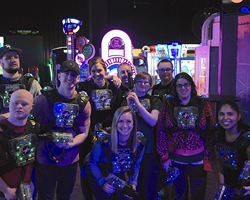Preparing Individuals with Intellectual and Developmental Disabilities for the Workforce

The inaugural Spartan Project SEARCH graduating class gathers for a group photo after commencement festivities.
- Connie Sung, Ph.D.
- Associate Professor
- Marisa Fisher, Ph.D.
- Assistant Professor
- Department of Counseling, Educational Psychology, and Special Education
- College of Education
For many young people, transitioning from youth to adulthood is stressful. For individuals with intellectual and developmental disabilities (IDD), the anxiety and obstacles experienced during that time can be overwhelming. Connie Sung and Marisa Fisher, researchers with MSU's Department of Counseling, Educational Psychology, and Special Education, co-direct Spartan Project SEARCH, a program that helps transition-aged youth with IDD overcome some of those obstacles.
Project SEARCH is an international program that works in collaboration with local and intermediate school districts and vocational rehabilitation agencies. It works at the state level to place individuals with IDD into internships at various host businesses during their final year of high school (between ages 18-26). MSU is the first large public university to be a host site for Project SEARCH.

Connie Sung (Left) and Marisa Fisher (Right)
"We see it as a really good opportunity because our campus can be used as a small community," said Sung. "It's an opportunity to provide training for the student interns, as well as for our graduate and undergraduate students. It is also an opportunity for our different departments to have experience working with people with disabilities."
Through MSU's Center for Research in Autism, Intellectual and other Neurodevelopmental Disabilities (C-RAIND), Sung and Fisher work in partnership with Ingham Intermediate School District (ISD), Michigan Rehabilitation Services, Community Mental Health, Bureau of Services for Blind Persons, Peckham, Inc., and Michigan Department of Health and Human Services. Sarah Winslow, director of Transition Programs for Ingham ISD, approached Sung and Fisher with the possibility of hosting Project SEARCH at MSU.
"We're trying to help students find competitive, integrated work, and that was something we couldn't do alone," said Winslow. "We need the support of our state partners to do that work. We had an opportunity here to make that happen, and add a capstone experience to our district's continuum of services—really looking at allowing our students to practice independence in a dignified and supported setting, that is almost identical—if not identical—to the setting that they would be working in if we weren't involved. That's what we were trying to create."
How It Works
Spartan Project SEARCH Internship Sites
- Campus Animal Resources
- College of Communication Arts and Sciences
- College of Education - Print and Copy Center
- College of Nursing - Weis Student Media Center
- Culinary Services in Brody Hall, Holden Hall, Owen Hall, and Shaw Hall
- Hospitality Services in 1855 Place, Akers Hall, Holmes Hall, and Snyder/Phillips Hall
- Landscape Services - Mechanics Shop and Gardening Substation
- MSU Bakers
- MSU Dairy Store
- MSU Extension
- MSU Federal Credit Union
- School of Social Work
- Spartan Linen Services
- Sparty's Café and Market in Brody Hall and Owen Hall
Each year, up to ten students from the Ingham ISD service area and neighboring counties apply and are accepted into Spartan Project SEARCH on MSU's campus. They spend time each morning and afternoon in a designated classroom with an instructor provided by Ingham ISD, working on independent living skills, social skills, interviewing skills, and academic tasks. The rest of the day is spent at their internship site (see box of current internship sites at MSU). The instructor guides and supports each student through the interviewing, assessment, and placement process to determine which internship site will be the best fit. The interns have the opportunity to work at three different internship sites that interest them throughout the year to give them a variety of work experiences.
Project SEARCH has requirements to ensure interns are competitively employed: post-school employment must be in an integrated environment, offer at least minimum wage, be at least 16 hours a week, and be a permanent—not seasonal—job. While at their internship site, interns are assisted by skills trainers from Peckham, Inc., as well as vocational rehabilitation counselors from Michigan Rehabilitation Services, who provide support to the interns as needed throughout the program and when the program ends. These supports help ensure all interns are prepared to achieve their integrated competitive employment goals.
MSU Extension is one of Spartan Project SEARCH's internship sites. Their experience has been so successful that supervisors Terri Badgley and Lori Martin created a permanent position for their first intern. The Spartan Project SEARCH graduate is responsible for sorting and delivering the mail for the entire building each day. According to Badgley, he enjoys his work, which is enabling him to make a tangible contribution to his family.
"I feel we had an exceptionally good experience," said Badgely. "Each intern's strengths and weaknesses were unique in what they brought to the table so we learned to adapt to what they could do successfully. Our goal was to help them learn as much as they could and be successful while doing it."
As supervisors, Badgley and Martin have the task of interviewing, training, and coaching the interns, and Badgley expressed that the work has been rewarding, not just to her, but to the entire staff.
"You could ask any of the staff in our department who assisted or worked with the interns and I know 100 percent they would tell you it was worth the added time and that we learned as much as they did through the process," she said. "We had some awesome young people and felt blessed to have played a small part in helping them move on to a new chapter in life."
Facilitating Successful Internships

A popular component of Spartan Project SEARCH involves planning and attending monthly social activities. Here, interns chose laser tag for a fun and lively team bonding experience.
Because MSU is the first large public university to take on the initiative, Sung and Fisher have no models to observe, so they have had to create innovative programs to address challenges as they've arisen.
For example, interns coming to a large campus for the first time can sometimes feel isolated. Sung and Fisher developed a peer mentoring program to give undergraduate students the opportunity to help the interns feel welcomed and part of the social fabric of the university. Through weekly interactions and monthly events, such as playing laser tag, bowling, or going to a Lansing Lugnuts minor league baseball game, the MSU undergraduates and interns learn from each other and often form lasting friendships.
To avoid interns getting lost on campus, Sung and Fisher developed a navigation training program, utilizing graduate students to show them how to follow walking directions and how to use public transportation. By the Fall semester, they are able to get to campus and to their internship sites independently. According to Fisher, this has also opened up their social lives. "They're now able to go out on the weekend," she said. "Right after we taught them how to use the bus system, an intern came in on Monday and said he took the bus to the movies that weekend. He suddenly saw this whole new world of opportunity."
It's not just the interns who face challenges. According to Sung and Fisher, sometimes the site supervisors and staff are a little apprehensive at first about hosting individuals with IDD. So they developed a disability awareness training program, administered by graduate students, to help supervisors and staff members in different MSU departments and units know what to expect and how to support the interns. "With the training program, we see a lot of growth with the staff and student employees," said Sung. "They are more receptive to the talents and things people with disabilities can bring and do, and it also increases their likelihood of hiring people with disabilities."
MSU hosts Spartan Project SEARCH at no charge to the interns. Support for the program comes through braided funding from Ingham ISD and Michigan Rehabilitation Services (MRS). To help support the additional efforts provided by MSU, such as the Peer Mentoring Program and Navigation Training, Sung and Fisher developed a service contract with MRS in 2017. Fisher has also received continuous funding since 2016 from the Michigan Department of Health and Human Services to provide additional supports to the interns. This funding gives masters and doctoral students, as well as post-doctoral fellows the opportunity to be involved in the project through service, training, and research projects.
Teaching, Research, and Service on Every Level
It takes a lot of time and many people working in close collaboration and coordination to help students with IDD make the transition from high school to a large university setting, train them for a new job, teach them how to use public transportation, and convince their parents that all of this is going to be okay. But each year the process becomes more efficient, and the effort is paying off with significant outcomes. The job attainment statistics alone are impressive: since the program began just two years ago (in 2016), 14 of 17 interns have become employed, many here at MSU. "A national statistic is that at the end of the program, 78 percent of completers will get a job, with 30 percent of those hired by the host site," said Sung. "So we are way above that." But the impacts go far beyond job attainment.
"These young people are leaving the program with a renewed sense of self and their ability," said Winslow. "And likewise, their families see their young people differently, as capable, young adults who can work. This is our expectation, that you will work—and we have very high expectations. We are holding students accountable to those expectations. And if they struggle, we're ready for that."
It's not just the interns who benefit. Everyone at MSU who has the privilege of working with these young people also benefit. Sung sums it up: "From an educator perspective, it's hitting on every single level—for the post-doc, doctoral, master's, and undergraduate students, and also the student with disabilities," she said. "As a practitioner, I really want to see all people with disabilities being integrated into the community and being treated the same way as everybody else, so that they can have a good quality of life and be independent and self-sufficient. This program does that by training the intern and also training the employers. From a researcher perspective, we are doing a lot of innovative stuff that we are able to share with the research community that they will be able to use in other places. This program really serves—research, teaching, and service—on every level."
Fisher loves seeing the pride of everyone involved with the project. "The students are proud to be involved and the interns are so proud to be here... they've been embraced as Spartans on all the job sites, with the peer mentors, with everybody. That's been really cool."
"During our end-of-program ceremony, so many people were in tears—tears of joy—including the site supervisors, the parents, and the interns," said Sung. "It's just an amazing experience for so many people."
The success of Spartan Project SEARCH is seen in its growth over the last several years, and it now has a sister site located at the Ottawa Building in downtown Lansing. In 2017, Sung and Fisher received the MSU Excellence in Diversity Award in the category of Teams-Emerging Progress, for Spartan Project SEARCH. They are always looking for new sites to host their interns! Please see the Spartan Project SEARCH website for more information.
- Written by Amy Byle, University Outreach and Engagement
- Photograph courtesy of MSU Communications and Brand Strategy